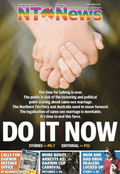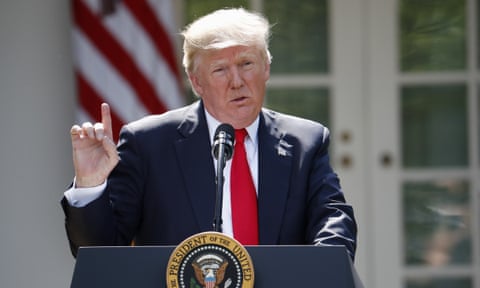Good morning, this is Eleanor Ainge Roy bringing you the main stories and must-reads on Wednesday 9 August.
Top stories
Donald Trump has vowed to respond with “fire and fury” if North Korea makes any more threats to attack the US. Pyongyang had threatened “physical” retaliation over new UN sanctions – on a day fresh evidence emerged that it had overcome one of the last major technical obstacles to being able to hit the US or western Europe with nuclear-armed missiles. “North Korea best not make any more threats to the United States,” Trump told journalists. “They will be met with the fire and the fury like the world has never seen.”
But analysts say the mixed messages sent by Trump’s administration are increasing the risk of miscalculation. Most observers argue negotiations are worth exploring in the absence of a viable military option. But the administration has given conflicting signals about its readiness for such negotiations – and shown little ability to get its different foreign policy factions on the same page.
Australian Border Force’s chief medical officer, Dr John Brayley, was personally told about Hamed Shamshiripour’s deteriorating mental health more than a year ago, and said he would review his care and records. Shamshiripour, an Iranian asylum seeker, was found dead on Manus Island on Monday morning. In a letter Brayley wrote and signed on 26 August 2016, he said he had been alerted to concerns about Shamshiripour’s mental health management and had requested his file. Email correspondence from Brayley’s executive assistant said Shamshiripour’s case was being “actively monitored” by Brayley personally. Brayley was again personally told – by email to his individual account – of Shamshiripour’s declining health in December.
Unions have hit back at the Minerals Council’s industrial relations wish list, saying it would drive down wages and prevent workers bargaining for job security. The ACTU secretary, Sally McManus, accused the council of calling for “absolute managerial prerogative with no protection for employees” after it called for a new round of industrial relations reform before the next election. McManus said the council’s push to to limit collective bargaining was unjust and unions would push Labor to protect the right to bargain for “honest and fair rates of pay”.
Channelling a $900m taxpayer loan into infrastructure to support agriculture instead of Adani’s coal rail line would be a bigger boost for regional economies and create many more jobs, according to a new economic analysis. A report by the University of Queensland economist John Quiggin found public investment in transport for agriculture, water projects and disaster preparedness would generate 632 full-time jobs, compared with fewer than 350 direct jobs over the 10-year life of an infrastructure loan to Adani. The report, commissioned by Farmers for Climate Action, comes as the Northern Australia Infrastructure Facility weighs up Adani’s application for a “bridging loan” to make up the gap in funding it is seeking from overseas lenders for one of the world’s largest coal projects.
A US American scientist is being called a “danger to public health” after publishing a book urging people to add more salt to their diet. In The Salt Fix, New York’s James DiNicolantonio says the World Health Organisation and the US and UK advisory bodies on diet have got it wrong with their advice to cut down on salt, and that the mineral is good for the body and will help people lose weight. “Most of us don’t need to eat low-salt diets,” he wrote. “In fact, for most of us, more salt would be better for our health rather than less. But But Public Health England says his advice is wrong and dangerous. Prof Louis Levy, head of nutrition science at PHE, said: “Diet is now the leading cause of ill health. By advocating a high-salt diet this book is putting the health of many at risk and it undermines internationally recognised evidence that shows a diet high in salt is linked to high blood pressure, a known risk for heart disease.”
Sport
Manchester City’s Samir Nasri has drifted to the periphery and, with a doping case hanging over his head, time is running out for a resurrection, writes Nick Ames. Almost nine years have past since his debut at 21 when he was hyped as “the new Zidane”. He is in limbo now and the obvious question is: how has it come to this for a player who still seems too young for such a sharp decline in status?
The Australian ultra-marathon swimmer Chloe McCardel has no fear of flesh-eating sea fleas, sharks or even ships as she prepares for her record non-stop quadruple English Channel crossing bid this month. “It’s been calling me since 2015,” says the 32-year old of the 136km swim. If she is successful, the swim will take nearly two days and nights to complete.
Thinking time

After turning 30 the writer Suzy Hansen moved from New York to Istanbul – and discovered that Americans would never understand their own country until they saw it as the rest of the world does. In her new book, Notes on a Foreign Country, Hansen studies her home from afar, and comes to some uneasy realisations in this long read. “In Turkey, the upheaval was far more unsettling: after a while, I began to feel that the entire foundation of my consciousness was a lie … For all their patriotism, Americans rarely think about how their national identities relate to their personal ones. This indifference is particular to the psychology of white Americans and has a history unique to the US.”
The Commonwealth Bank money laundering scandal raises a raft of troubling questions; about corporate governance, about the enforcement of financial regulation, and about the internal culture of the Commonwealth Bank. What are the implications for the ongoing debate about income inequality, asks the economist Tom Westland: “This scandal raises questions about power, and about the cult of the ‘leader’ that has become increasingly dominant in Australia’s economy and, more broadly, its society. What happens when too much wealth and power is placed in the hands of too few people?”
The charity founder Suzanne Hopman helps the homeless of Sydney into crisis accommodation when they have nowhere else to go. They often come to her traumatised, cold, hungry and dirty – and she welcomes them with respect and bottomless kindness. What does Hopman think are the root causes behind Australia’s worsening homeless crisis? Read the latest part of Guardian Australia’s series on homelessness, No fixed address, here.
Media roundup

The NT News has a strong front page, tinting its banner in rainbow colours and declaring, “Do it Now.” “The time for talking is over,” the text reads. “The public is sick of the bickering and political point-scoring about same-sex marriage. The Northern Territory and Australia need to move forward. The legalisation of same-sex marriage is inevitable. It’s time to end this farce.” The Daily Telegraph reports how overnight raids have dramatically changed Sydney’s criminal underworld, as hundreds of police swooped on homes and businesses across 23 neighbourhoods including luxury eastern suburb mansions at dawn, over alleged ties to international drug syndicates. And the ABC has a long read on adult acne, revealing that nearly half of all Australians have acne into their 30s, and what can be done about this awkward skin condition, including medication, changes in diet and changing your bed clothes at night.
Coming up
Both the Senate and the House of Representatives will sit. Government legislation including citizenship changes, gambling laws, media reforms and amendments to the Migration Act will be debated.
The Commonwealth Bank will release its full-year results to the Australian Stock Exchange early on Tuesday before its chief executive, Ian Narev, holds an investor briefing at 11am.
The alleged cocaine smuggler Cassie Sainsbury is due back in a Bogotá court where a judge will consider whether to approve her plea deal to serve just six years jail.
Sign up
If you would like to receive the Guardian Australia morning mail to your email inbox every weekday, sign up here.
